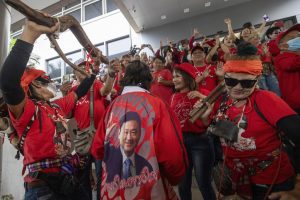Yesterday, a lawyer for former Thai Prime Minister Thaksin Shinawatra said that the imprisoned politician is preparing to draft a request for a royal pardon.
Thaksin returned to Thailand in a blaze of publicity last week after spending 15 years abroad in self-exile to avoid criminal charges that he claims were politically motivated. After landing by private jet at Bangkok’s Don Mueang airport to a welcome from red-clad supporters, he was transferred to prison to serve an eight-year sentence that was handed down in 2008.
According to a report by Reuters, Thaksin’s lawyer Winyat Chartmontri said that his client was now organizing the documentation to request a royal pardon from King Vajiralongkorn.
“Thaksin is proceeding on his own and is currently in the preparatory stages of documentation and drafting the request,” Winyat told the news agency, adding that Thaksin would decide on the exact timing of when to submit the request.
The request for a royal pardon is likely related to the broader political context. The same day that Thaksin returned to Thailand, Srettha Thavisin of the Pheu Thai Party (PTP), which is closely associated with the former leader, won a parliamentary vote to become the country’s next prime minister at the head of a sprawling, 11-party unity government.
Both Thaksin and the PTP deny any connection between the two events, but as I’ve argued before, Thaksin’s return is only possible given the realignments that have taken place in Thai politics since the May election, which saw the emergence of the Move Forward Party (MFP), a more radical and popular alternative to Pheu Thai. At the May 14 election, the MFP won a surprise victory, winning 150 of the 500 seats in the House of Representatives, ahead of the PTP’s 141, on a radical platform that included pledges to reform the military, break up the country’s powerful business monopolies, and amend the controversial lese-majeste law, which criminalizes criticism of the monarchy.
But after encountering opposition from the military-appointed Senate, which effectively prevented the MFP’s leader Pita Limjaroenrat from becoming prime minister, it fell to Pheu Thai to form a government. It eventually did so by forming an 11-party coalition that excluded the MFP but included two parties closely associated with the Thai military, which overthrew Thaksin-aligned governments in 2006 and 2014.
The pact effectively ended a period in which Thaksin was the sworn enemy of the country’s conservative elites, who now view him as the lesser of two evils next to the more explicitly anti-establishment MFP.
That there has been some sort of arrangement between Thaksin and elements in the conservative establishment, perhaps predating the election, or concurrent with the formation of the new PTP-led government, is a logical inference.
As Thaksin’s lawyer suggested, the timing of a request for a royal pardon remains unclear. It will likely await the settling of the political dust, with Srettha expected to submit his list of new cabinet members for royal endorsement tomorrow. If it hasn’t happened already, there will also presumably be some negotiations regarding the scope of Thaksin’s political role, if any, when he is released from prison.
One thing is clear: Thaksin, one of the most pragmatic leaders of his generation, would not have returned to Thailand merely to rot in prison.

































